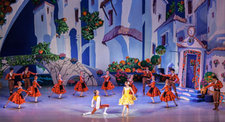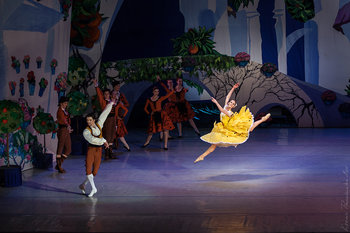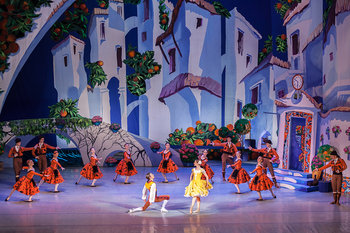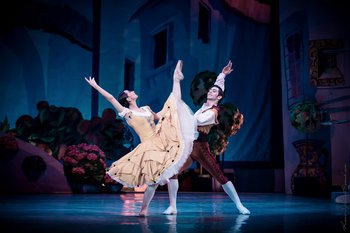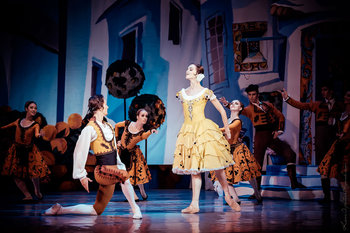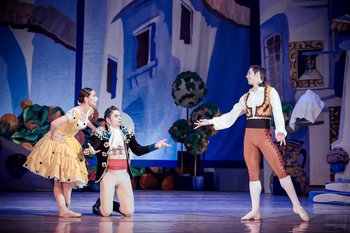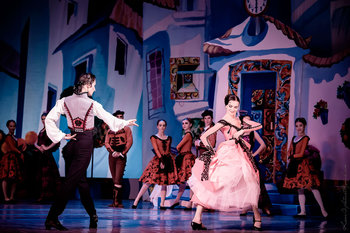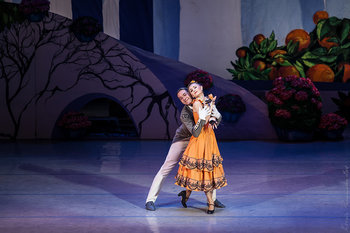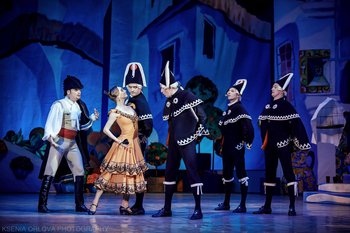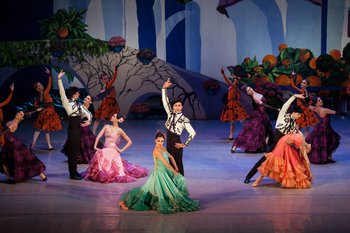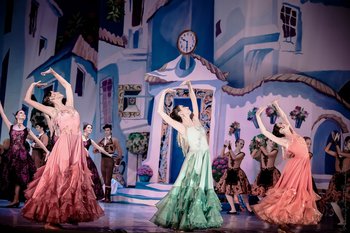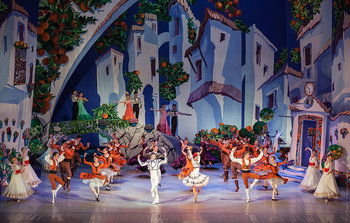SUMMARY
A Spanish village. A Miller, while being mocked by his wife, is trying to teach a bird in a cage to sing at the wave of his hand. But all his attempts are in vain, until the Miller's wife begins to feed the bird, which at that very instant, as if on cue, begins to sing. Such a wonderful event makes her beloved spouse happy and joyful, which comes out through dancing and embracing.
Meanwhile, a neighbor appears on the bridge. He blows the enchanting Miller’s wife an “air” kiss, which infuriates the yard’s owner. He drives the neighbor away. The Miller's wife is caught by the act of her husband, who once again confirms that he loves her!
A procession is approaching the Miller’s house. This is the authoritative and confident Corregidor with his retinue. A sign of his high office is his triangular hat. Seeing the young beauty that is the Miller’s wife, he deliberately drops his scarf on the ground. She picks it up and returns it to the magistrate. The Corregidor’s jealous wife immediately felt the danger concealed by the beauty of the Miller’s wife, and hurried to take her honorable husband away from this dwelling. And the Miller, jealous of his wife and the magistrate, begins to pretend to court his wife’s friend Gabrielle. This is enough for the Miller’s wife to raise a quarrel. This once again confirms that she loves only her husband.
But enough entertainment, time to get to work. The Miller's wife is left alone. Suddenly his smitten passions for the young peasant woman return to the Corregidor. The Miller’s wife deftly avoids his embrace. The Miller hurries to the noise that arose, and, despite the position of his wife’s abuser, gives a good rebuking to the admirer. Having recovered from the blows, the Corregidor vows to settle the score with the Miller and his wife.
The village is preparing for the festival of flowers, where good wine and entertainment is waiting for all. The holiday is interrupted by soldiers who were sent to arrest the Miller. Together with them comes a group of peasants and guests. The sad Miller’s wife remains with her friend Gabrielle. Dandy appears, whom the Corregidor sent to the Miller’s courtyard, so that he can investigate the mood of the beautiful peasant. But Dandy immediately falls in love with Gabrielle, forgetting about his assignment.
The magistrate secretly comes to the courtyard of the Miller with the intention of obtaining the favor of the beautiful Miller’s wife, but she escapes from the Corregidor. He rushes after her, but on the bridge the woman pushes away her obsessive suitor, and he falls into the river. Getting out of the water, wet and disappointed in his failure, the magistrate comes into the Miller's house in search of dry clothes and, having changed into his clothes, decides to also take a nap in his bed.
At dawn, the Miller escapes from prison. Coming home, he finds the Corregidor’s clothes, and his three-cornered hat, and he himself in his own bed! Thinking that his wife had cheated on him, he decides to take revenge on the magistrate and become his wife's lover. Grabbing the offender's clothes, the Miller goes off.
Waking up, the Corregidor in the clothes of the Miller goes outside. His guards decide that this is the fugitive, and grab him. People come running. In the vague morning rays of the sun, the real Miller, who has put on the three-cornered hat, everyone thinks to be the Corregidor.
The miller's wife rushes to save her husband from the guards, and suddenly realizes that this is none other than the magistrate who has outsmarted himself. Having understood that the man in the three-cornered hat is the Miller, who explains to his fellow villagers about his amazing disguise, the peasants drive the Corregidor and his soldiers from the village.
Such an event is not a sin and should be celebrated!
The ballet recital follows the narration principle of the Spanish novels that is to tell the stories not coupled directly with each other. The principle opens up a possibility to stage two brilliant pieces of Manuel de Falla, the famous composer of the beginning of the 20th century: “NIGHTS IN THE GARDENS OF SPAIN” (“NOCHES EN LOS JARDINES DE ESPAÑA”) and “THE THREE-CORNERED HAT” (“EL SOMBRERO DE TRES PICOS”).
The first masterpiece “The Nights in the Gardens of Spain” (subtitled by author as “symphonic impressions for piano and orchestra”) is composed in a form of triptych with a special title for each part: “El en Generalife” (“In the Generalife”), “Danza lejana” (“A Distant Dance”), and “En los jardines de la Sierra de Cordoba” (“In the Gardens in the Sierra de Cordoba”). The ballet is created for the music filled with а poetry of Spanish nature and a lyricism of the Spanish heart – for the melodies overendowned with both dreamy lyricism, harsh consonances and vigorous rythms. Due to the Spanish legends and tales in its canvas, the dance is of a romantic and fantasy nature. Mythical heroes tell us about the search for enjoiment and love…
The second masterpiece presents a fantasy on a folk and historical theme: dynamic picture of life in Spanish province after the well-known novel by Pedro Antonio de Alarcon. The ballet music scintillates with wit and fascinates with composer’s design and technique. From time to time, the author weaves the guitar improvisations, flamenco rythms and the Spanish folk dances – fandango, jota, sevillianas, and farruca – into his ingenious music canvas.
Combining the two music pieces in one performance, we got an amazing choreographic tale about love. But love in quite different forms: unearthly love and earthly one.
Aniko Rekhviashvili
